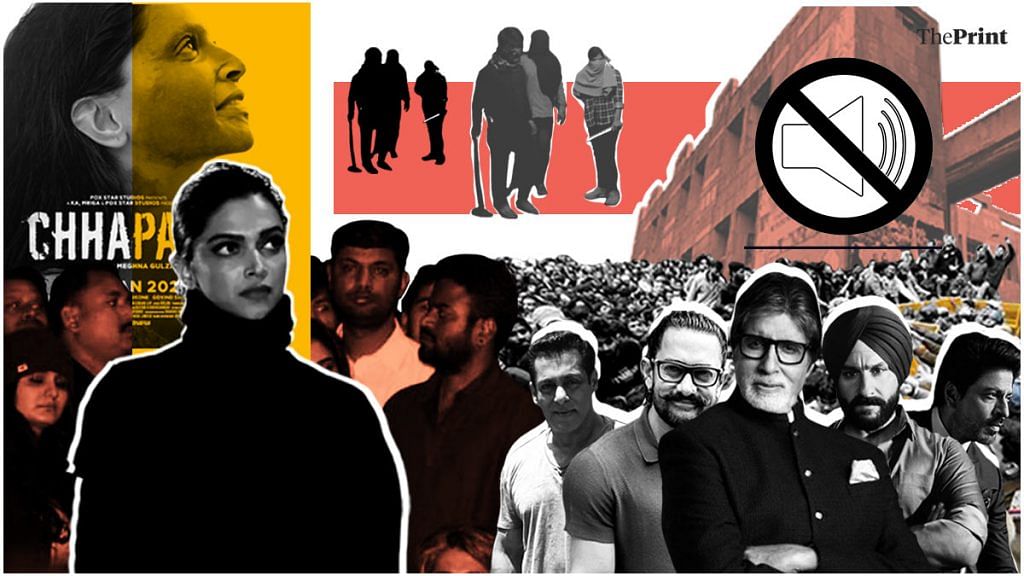Bollywood actor and producer Deepika Padukone’s visit to JNU Tuesday in solidarity with students who were attacked by masked goons has captured headlines. The star joins a handful of Bollywood celebrities, such as Zoya Akhtar, Swara Bhasker, Anurag Kashyap, Sonam Kapoor, Alia Bhatt, who have spoken against the violence. Padukone’s visit came two days ahead of the release of her film Chhapaak.
ThePrint asks: Deepika at JNU: Promoting Chhapaak or breaking Bollywood stars’ safe silence on politics?
Deepika’s JNU visit not about politics, but about making a statement against violence. It’s a game-changer
Film critic, author and journalist
It’s myopic and frankly ridiculous to imagine that an A-list actor with a film releasing in two days would do this as a publicity stunt. I’ve been reporting on the Hindi film industry for more than two decades, so I have a front-row seat on what artists go through when they take stands and express political opinions. It’s a very different environment from Hollywood where personal opinions are seen as separate from work. Here the consequences are real and the backlash is brutal. There is a very distinct possibility that your film will be impacted. It’s an absolute minefield and I understand why many artists choose to be silent.
Films take passion, time, money, and it’s brave to jeopardise all of this to take a stand. I don’t think Deepika’s visit to JNU is about politics, ideology, religion — it’s about making a statement against violence. I think it will be a game-changer.
A star who wants to stand up with students does not walk in with a crew of PR and marketing managers
Film director, screenwriter and author
Do you know that there are 30 crore students in India and not even 1 lakh are protesting? By going to JNU, Deepika Padukone very courageously took a stand to support 0.1 per cent students of India, majority of whom are Communists and freeloaders affiliated to Left parties. They associate themselves with international agencies who indulge in sinister politics. She would rather support JNU, a Disneyland for break-India forces, than the 99.9 per cent of India’s students who are working hard to build a ‘new India’.
I want to ask one question to Deepika — for someone who has worked in Hollywood, can she ever go to Columbia, Harvard or any other university and support 0.1 per cent Communist students? Also, a star who wants to stand up with students does not walk in with a crew of PR and marketing managers.
Now, if something goes wrong with the film, the studio will be the biggest loser, not her. I think she’s a great icon but I would have respected her more if she had taken a picture with Nirbhaya’s mother or with those acid attack victims.
This is surely a marketing gimmick since the film is about to release in two days and hadn’t generated much hype until now. News channels have been excessively covering these elitist student protests in JNU and on Carter Road and that’s where she decided to go. She has hurt me as a citizen of India.
Debate on Deepika’s solidarity act distracts from the main political issues at hand
Film actor
I don’t understand why this is even a debate. Deepika Padukone showing solidarity with JNU students is the right thing and, as a fellow actor, I respect her for putting her neck out. But the debate surrounding her distracts from the main political issues at hand.
I feel college students in India are now caught in a war between the ruling alliance and the opposition with a clear Left vs. Right narrative. Everything has been muddled together into an anti-government protest — first it was the CAA, then CAA-NRC, then protest violence, and now Deepika Padukone’s solidarity act.
I believe the initial CAA-NRC protests were premature. People were taking to the streets without even understanding what they were protesting. Now, it has spiralled out of control. Nothing is wrong with the CAA because it is a law for minorities in neighbouring Muslim-majority countries, not India. What’s wrong with giving refuge to persecuted communities?
The media and the lack of objective journalism have also contributed to this mayhem. There is no effort to put the facts out or equal presentation to both sides of the political spectrum.
Easy to discount Deepika’s JNU visit as PR stunt, but standing next to injured Aishe Ghosh a brave act
Senior journalist, author and former editor of India Today
It is easy to discount Deepika Padukone’s visit to JNU as a PR stunt for Chhapaak, but that is only because people have such low expectations from those in the film industry.
Even in the case of Padmaavat, she was not willing to stand down, regardless of the beheading threats. As Deepika said during a TV interview this week, the roots of what is happening in JNU and Jamia were sown during the Padmaavat controversy where lumpen people went unpunished for their words and deeds.
She was brave enough to say “darr bhi lagta hai, dukh bhi hota hai”. At a time of no empathy and sympathy from those in public office, for someone as iconic as Deepika to admit her humanity is a tremendous feat. At a time of so much hatred and division, such a simple gesture of standing next to an injured Aishe Ghosh and listening quietly to Kanhaiya Kumar in full flow are brave acts.
The cost of speaking out is enormous in India for a public figure, in terms of social media trolling and calls to boycott. Chhapaak is also produced by Deepika – she can lose a lot. But as Deepika showed Tuesday, the cost of silence is even greater. It is making us all less human.
Also read: Panipat to Padmaavat: Can Bollywood make historical drama without hurting sentiments?
By Pia Krishnankutty, journalist at ThePrint
